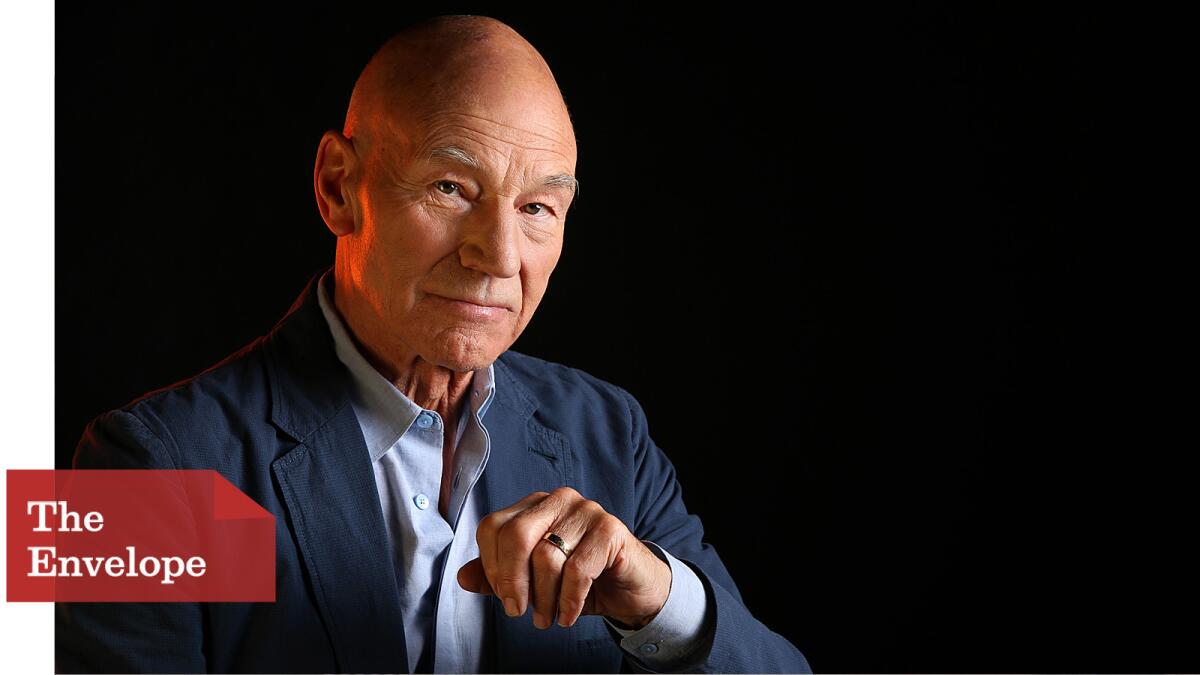Patrick Stewart uses ‘Blunt Talk’ to hone his character in his first turn as a comedy lead

- Share via
He’s all about that bass. When Patrick Stewart speaks, his voice swoops and soars, one minute thundering, the next a whisper. He’s used it to great effect on stages and screens large and small for over 50 years. And in interviews as well. Stopping by The Times offices to discuss his latest venture, “Blunt Talk,” with The Envelope, Stewart holds forth about the show’s origins and his recent evolution as a comic actor, his voice adding a Shakespearean elegance to every tale.
The Starz series, created by Jonathan Ames (“Bored to Death”) and set in motion by executive producer Seth MacFarlane, is a tonal roller coaster, veering from absurd to melancholy in the blink of an eye. Fortunately, Stewart has the pipes and the chops to handle it. His first turn at a starring role in a comedy has earned him his third Golden Globe nomination. As newsman Walter Blunt, he navigates the show’s hairpin turns and quirky colleagues with a drink, a cuddle or a quote from the Bard.
SIGN UP for the free Classic Hollywood newsletter >>
Seth MacFarlane has said that “Blunt Talk” came about because he wanted to create a show around you.
That’s what he told Jonathan. “I want some ideas.” That was before I even knew he was thinking about this.
You weren’t involved yet?
No. I worked with Seth for nearly 12 years because he cast me in “American Dad.” When he took me to lunch and said, “How’d you like to do a half-hour live-action comedy show?” I said, “Would you be involved?” He said, “Well, kind of, yeah. I’ll be a producer.” And I said, “Done.” And that was it. No more conversation.
You didn’t know anything about it?
No, I walked away knowing nothing. But it’s the kind of thing where I thought nothing will come of this. Patrick Stewart in a half-hour live-action comedy? It doesn’t sound right. I’ve devoted 50 years of my life to making people sob and gasp and cry. Who’s going to take this seriously? But then I met Jonathan. He’s a person of such substance, and quite eccentric himself, that I immediately felt safe, and heard. I was involved for two years. We both lived in Brooklyn, and we would meet at a funky, rustic, typically Brooklyn coffee shop every couple of weeks and we’d sit for two or three hours and tell one another our life stories over several large cups of coffee.
I got the idea very early that we were dealing with a fairly complex individual whose lifestyle and professional ambitions were not in sync. I became very excited about all the contradictions in Walter. But my determination was that he should not be funny. No gags, no jokes, no routines. I couldn’t see myself in that kind of show.
The interesting thing for me — which for a number of years I’d sort of worked on, but it became essential in “Blunt Talk” — was creating a character who was a character but was at the same time fundamentally Patrick Stewart.
How so?
If I can make him this close to some of my own rhythms and habits and mannerisms, all there is then is just getting the objectives right. It allowed me to investigate a quality of silliness that had always been there. Two names have played a big part in this: Seth MacFarlane and Ricky Gervais. Ricky offered me an episode of “Extras” in its first season and that was kind of the breakthrough, where I thought, “I don’t have to be funny. All I have to be is very serious, and it proves to be funny.” I began to get it then.
In the pilot Walter seems unhinged, until it becomes evident that he’s just driving the clown car.
Yes. If he’s dysfunctional, what about everybody else? From Jacki Weaver [as his producer Rosalie] right down to Karan Soni [as Martin].
And your manservant, Harry.
Adrian Scarborough is the sweetest, gentlest, most good-natured, witty man, adored by everyone on set.
You would be so much better off without him in almost every conceivable way, except he’s your best friend.
As he says, “What would I do without you, Major?”
And I say, “What would I do without you, Harry?” And then we snort cocaine.
That relationship is core. And those bedtime stories!
In the Season 1 finale, he reads you a great line from “The Once and Future King,” by T.H. White, which sums up the show. “If people could be persuaded to read and write, not just to eat and make love, there was still a chance that they might come to reason.”
It affects me every time. We had difficulty shooting that moment because it was quite emotional.
More to Read
Sign up for The Envelope
Get exclusive awards season news, in-depth interviews and columnist Glenn Whipp’s must-read analysis straight to your inbox.
You may occasionally receive promotional content from the Los Angeles Times.










